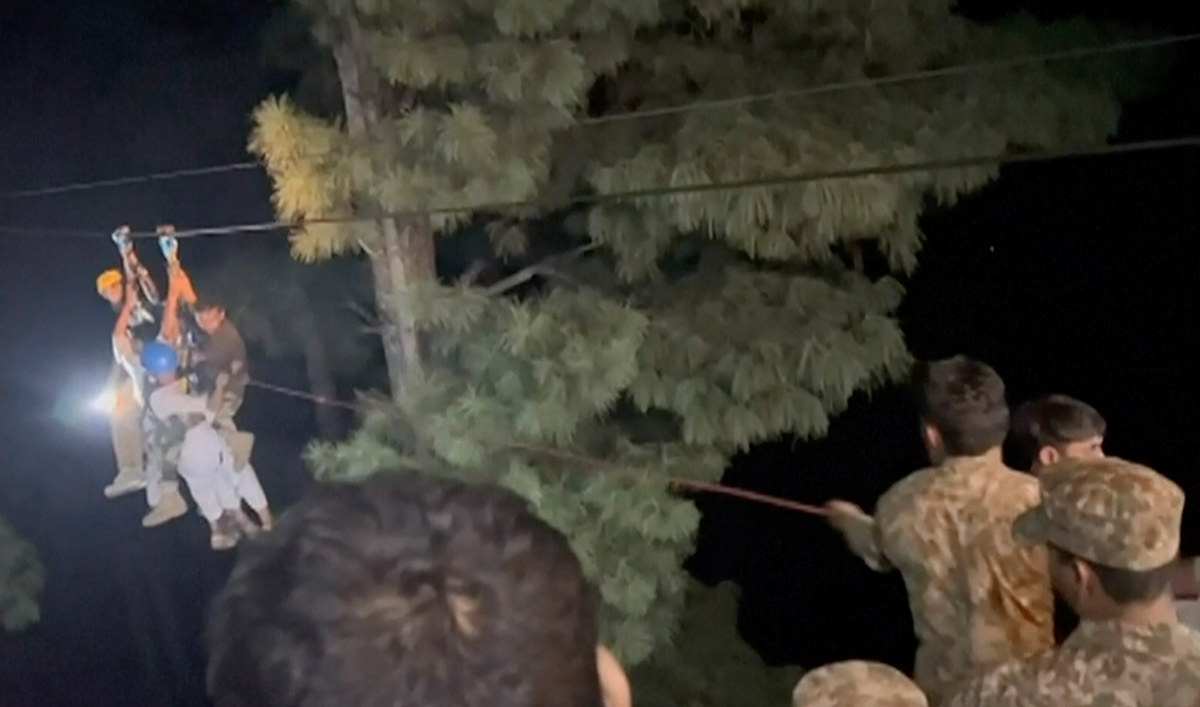ISLAMABAD: A nail-biting rescue of children dangling hundreds of meters in the air in a cable car in Pakistan this week faced unprecedented challenges, with officials fearing the last remaining cable could snap at any moment, rescuers and military officers said.
The sixteen-hour rescue effort gripped global attention, as Pakistan’s air force, military, and civilians on the ground struggled to rescue eight people, mostly children, from the flimsy cable car, which was dangling 183 meters (600 feet) over a river below after one of its cables broke.
“It was very stressful,” said Major Asad Khan Marwat, who played a key role in coordinating the operation from the ground.
An Air Force helicopter tried to approach the cable car for hours, but with strong, gusty winds it was difficult to get close.
Asad said rescuers were worried that dropping a rescuer onto the cable car, which was only built for seven or eight people, could cause it to fall. But they struggled to try to convince the terrified children to clip themselves into harnesses and step off the car so they could be winched up by helicopter.
Eventually, one child tried just before nightfall.
“That kid was able to wear that harness and he hooked himself up,” said Asad. “He was a brave kid.”
As the light faded, winds picked up. Worried that any further attempts by air would be too dangerous, rescuers called the helicopters off.

In this image made from video provided by Pakistan Rescue Military, Pakistani military and local rescue workers bringing last people from cable car to safety using ropes and harnesses, in Battagram district in Khyber Pakhtunkhwa province, Pakistan, Tuesday, Aug. 22, 2023. (Pakistan Rescue Military via AP)
Fearing that the last cable would snap and with the children getting hungry — two fainted during the ordeal — they decided the rescue would have to continue from the ground.
“We had to do it at any cost,” said Lt. Col. Muhammad Kamran, who helped oversee the operation with the Special Service Group (SSG), the special forces unit.
One local resident, Habibullah, 23, told Reuters he had done around six rescues along cable car lines before, albeit much smaller ones. He convinced the military he should travel out along the cable as a trial run.
He strung up a simple charpai — a wood and string cot — and tied it to the remaining cable. He pulled himself out toward the cable car but was unable to get close enough.
Still, military officers were now convinced it could work with the right equipment.
A resident on the other side of the valley, Sahib Khan, 24, who had been provided a harness by rescuers, set out from the right side of the river bank — opposite from the main rescue operations — and managed to bring back one person.
Asad and local residents tried to encourage the remaining children via phone.
“We consoled them on the phone. I said: ‘You just wear the harness, you are safe, you will go nowhere’.”
Two professional zip-liners who run an adventure company were brought to the area and then rescued three children in one go.
Carefully securing the children into harnesses, Mohammad Ali said he then double-checked the clips.
“Kids, where we are securing you, please don’t fiddle with it,” he told them before soaring back across the valley with the three in tow.
After Ali fractured his hand, a special forces commando took his place on the next and final zip-line trip.
They delivered the final three to the hillside, hovering in harnesses, where their families waited, to cries of ‘God is Great’.
“It was a moment of great achievement,” said Lt. Col. Kamran.
“The locals were very happy, very thankful to Allah Almighty ... we were thankful to them for their support.”
“They had their dear ones with them, they had their mothers, they held them and greeted them.”
Meeting later in the capital Islamabad on Thursday, rescuers, residents, and students gathered, first attending a celebration ceremony with the caretaker prime minister and later speaking together over tea and samosas as they bonded over the high-stakes rescue.
“I spoke with them (the rescued children) and it felt they were just like my family members, my own kids, my own brothers, I was very happy to see them,” Kamran said.















